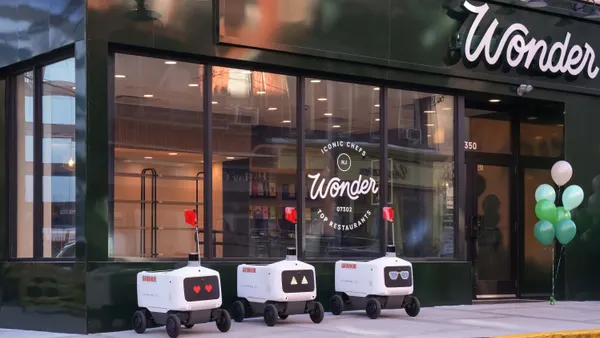Dive Brief:
- DoorDash partnered with fintech BlueVine in late April to provide a customized Payment Protection Program application for DoorDash merchant partners, according to a company release shared with Restaurant Dive. Nearly 200 restaurant owners have collectively received more than $6 million in PPP loans through the partnership, and the majority of these recipients are independent restaurants that employ fewer than 10 people.
- DoorDash will donate the small proceeds from its partnership with BlueVine to the California Restaurant Association's Restaurants Care/COVID-19 grants program, which gives one-time financial support to restaurant employees facing unexpected challenges. DoorDash will also donate to the Opportunity Fund's Small Business Relief Fund, which raises support for small businesses impacted by the novel coronavirus pandemic, especially businesses run by women, people of color and immigrants. DoorDash will match donations to these funds three to one.
Dive Insight:
Since the first round of PPP funding, many financial experts and loan recipients have recommended pursuing aid through fintechs like BlueVine instead of traditional banks. This is especially pertinent for independent restaurants, which may not be prioritized by a major lender because of their small size — especially if they aren't members of that particular bank, Christopher George, a former banker and SVP of client strategy at Nymbus, told Restaurant Dive in a previous interview. It's also possible that a major bank could max out on PPP lending before it can respond to all of its applications.
In the midst of PPP rounds, some fintechs have gained direct lender status like BlueVine, which gives small operators more options when pursuing a loan and could get them their money faster than a traditional bank. BlueVine has issued more than $4 billion in loans to more than 100,000 small businesses, Kevin Huang, VP of merchant strategy at DoorDash, told Restaurant Dive in an email. The delivery platform selected the fintech for its fast loan processing and day-of funding capabilities.
"In late March we hosted a virtual webinar where we learned that many of our merchant partners were finding it difficult to navigate the Paycheck Protection Program (PPP) loan application, in order to access funds necessary for ongoing payroll, utility, and rent expenses," Huang wrote. "BlueVine's technology enabled DoorDash merchants to be served efficiently and effectively."
In some cases, DoorDash merchants have been approved for funding in as little as 24 hours through BlueVine, Huang said. Jazmine Lalicker, co-owner of seafood restaurant the Shuckery in Northern California, received a PPP loan through the DoorDash and BlueVine partnership just a day after she applied. Previously, Lalicker had attempted to apply for a PPP loan through Wells Fargo, but initially didn't even receive an application from the bank before it closed to new applications, she told Restaurant Dive in an interview. Later she was able to submit a signature form acknowledging her interest in an application, but chose to apply through DoorDash and BlueVine instead.
"[The BlueVine application] was really great because it had all of these little checkmarks... so after I submitted it, the one-page application, I knew that I had done it correctly, which was huge because submitting some of this stuff through the SBA... the applications were really long and confusing," she said. "I submitted it and the next morning I was approved."
After she received her loan for $125,000 through BlueVine, she withdrew her application request at Wells Fargo, which had never responded to her.
This partnership could win DoorDash a new swath of restaurants that haven't yet applied for PPP or are struggling to do so through a major lender, though some experts say that demand for the program has decreased as the Aug. 8 deadline nears. Still, DoorDash's support for independent restaurants throughout this crisis, including its launch of DoorDash Storefront — which enables restaurants to create their own turnkey online stores — and reduced or waived commission fees for some restaurants, establishes the business as a dynamic resource for small restaurants. Rivals have also launched new features, like pickup, to help restaurants weather the pandemic, and more programs tailored to struggling independents could arise as the outbreak continues and delivery commissions weigh on the relationship between restaurants and third-party delivery providers.











